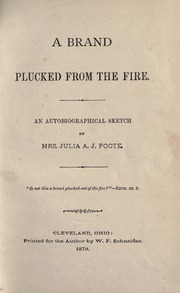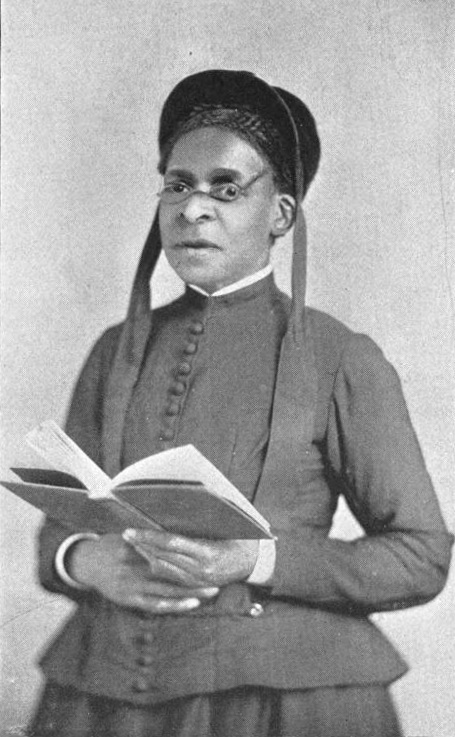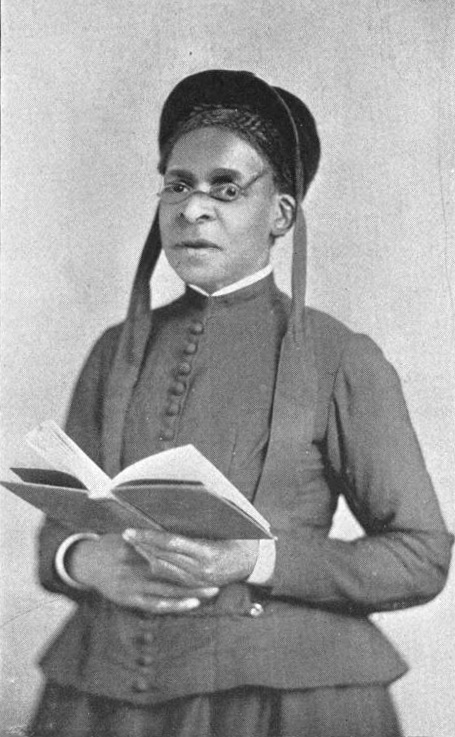
In the past few weeks we have told the stories of remarkable black women of the nineteenth century. Some were born slaves and some were born free. All of these women were courageous examples of what can be done by a woman who does not let her circumstances dictate to her. These women rose above many hardships including poverty, illness, prejudice, internal conflicts, and the limitations of their times to follow their call from God and affect the lives of many other people for good.
During the nineteenth century many black and white women published their autobiographies. There are also many fine diaries from that century when women wrote about their thoughts, dreams, and ideas that they could not express publicly because of their gender or color. It was acceptable for women to write and so many availed themselves of the opportunity to express themselves using this medium.
Julia A. J. Foote (1823-1900) – Part 2
Is not this a brand plucked out of the fire?(Zechariah 3:2).
Last week we began the story of such an outstanding example of the courage that was necessary for a black woman to express her thoughts publicly. Julia Foote sought to leave her story so that she could “testify more extensively to the sufficiency of the blood of Jesus Christ to save from all sin.” Her autobiography was published in 1879.
In this post we will look at some samples from her writing. Julia left the stories of her birth and parentage, early childhood including education, lessons learned from her experiences, her conversion and subsequent desire for more knowledge of God, her marriage, her call to preach the gospel, early work as an evangelist, the persecution she suffered as a black woman, her times of sadness at the death of family members, and ended with “A Word to My Christian Sisters”.[1]
It is a fascinating book and I encourage you to read all of it. Here are some excerpts to whet your appetite.
From chapter 2, “Religious Impression – Learning the Alphabet”[2]
Dear children, with enlightened Christian parents to teach you, how thankful you should be that “from a child you are able to say that you have known the Holy Scriptures, which are able to make you wise unto salvation, through faith which is in Christ Jesus” (2 Tim. 3:15). I hope all my young readers will heed the admonition, “Remember now thy Creator in the days of thy youth” (Eccles. 12:1) etc. It will save you from a thousand snares to mind religion young. God says: “I love those that love me, and those that seek me early shall find me” (Prov. 8;17). Oh! I am glad that we are never too young to pray, or too ignorant to fear, dear children; come right to Jesus.
After Julia’s conversion her constant thought was to get an education so she could read the Bible. One day her minister blessed her with a new Bible.
I now felt the need of an education more than ever. I was a poor reader and a poor writer; but the dear Holy Spirit helped me by quickening my mental faculties. O Lord, I will praise thee, for great is thy goodness! Oh, that everything that hath a being would praise the Lord! From this time, Satan never had power to make me doubt my conversion Bless God! I knew in whom I believed.[3]
Julia suffered persecution for faithfully following her calling for two reasons – she was a woman and she was black. She addressed both of these issues.
From ‘Women in the Gospel”:[4]
I could not believe that it was a short-lived impulse or spasmodic influence that impelled me to preach. I read that on the day of Pentecost[5]was the Scripture fulfilled as found in Joel ii. 28,29; and it certainly will not be denied that women as well as men were at that time filled with the Holy Ghost, because it is expressly stated that women were among those who continued in prayer and supplication, waiting for the fulfillment of the promise.[6]Women and men are classed together, and if the power to preach the Gospel is short-lived and spasmodic in the case of women, it must be equally so in that of men; and if women have lost the gift of prophecy, so have men.
… But the Bible puts an end to this strife when it says: “There is neither male nor female in Christ Jesus” (Gal. 3:28). …. I may further remark that the conduct of holy women is recorded in Scripture as an example to others of their sex. And in the early ages of Christianity many women were happy and glorious in martyrdom. How nobly, how heroically, too, in later ages, have women suffered persecution and death for the name of the Lord Jesus.
In looking over these facts, I could see no miracle wrought for those women more than in myself.
Though opposed, I went forth laboring for God, and he owned and blessed my labors, and has done so wherever I have been until this day. And while I walk obediently, I know he will, though hell may rage and vent its spite.
From “Indignities on Account of Color – General Conference”:[7]
This next story concerns a time that Julia was traveling.
I staid one night in Oxford, at Mr. Jackson’s. At six o’clock the next morning I took passage on the canal packet “Governor Seward,” with Captain George Keeler. That night, at a late hour, I made my way into the ladies’ cabin, and, finding an empty berth, retired. In a short time a man came into the cabin, saying that the berths in the gentlemen’s cabin were all occupied, and he was going to sleep in the ladies’ cabin. Then he pointed to me and said: “That nigger has no business here. My family are coming on board the boat at Utica, and they shall not come where a nigger is.” They called the captain, and he ordered me to get up; but I did not stir, thinking it best not to leave the bed except by force. Finally they left me, and the man found lodging amongst the seamen, swearing vengeance on the “niggers.”
The next night the boat stopped at a village, and the captain procured lodging for me at an inn. Thus I escaped further abuse from that ungodly man.
Finally a word of advice from Julia to her Christian sisters:[8]
DEAR SISTERS: I would that I could tell you a hundredth part of what God has revealed to me of his glory, especially on that never-to-be-forgotten night when I received my high and holy calling. The songs I heard I think were those which Job, David and Isaiah speak of hearing at night upon their beds…
Sisters, shall not you and I unite with the heavenly host in the grand chorus? If so, you will not let what man may say or do, keep you from doing the will of the Lord or using the gifts you have for the good of others. How much easier to bear the reproach of men than to live at a distance from God….
“Now, the God of peace sanctify you wholly – your whole sprit, soul and body. 2 Thess. v. 23. Glory to the blood!” “Faithful is he that calleth you, who also will do it. Paul says: He is able to do exceeding abundantly, above all that we ask or think. Eph. iii.20.
We have now covered the stories of three black women preachers of the nineteenth century – Jarena Lee, Zilpha Elaw, and Julia A. J. Foote. My prayer is that God will raise up many more female preachers, of all races and denominations, to spread the good news that Jesus died for sinners and brings peace, reconciliation, joy, love, and fulness in the Spirit for all who place their faith in him.
[1]William L. Andrews, Ed. Sisters of the Spirit: Three Black Women’s Autobiographies of the Nineteenth Century (Indianapolis, IN: Indiana University Press, 1986). p. 227
[2]Ibid, p. 170
[3]Ibid. p. 182 – Note the way Julia includes phrases from the Bible throughout her writing. Note here allusions to Lamentations 3:22, 23, Psalm 150:6, and John 20:31.
[4]Ibid. pgs. 208-209.
[5]See Acts 2.
[6]See Acts 1:14.
[7]Ibid. pgs. 215-216.
[8]Ibid. 227-232..



